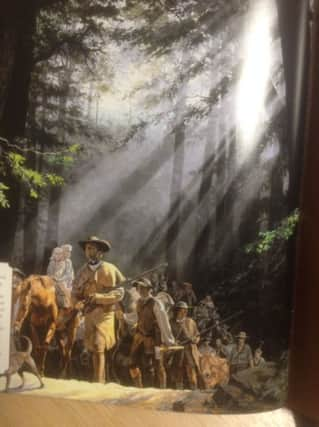The Ulstermen who set up Presbyterianism


A pioneering spirit in American Presbyterianism was the Rev Francis Makemie, a pastor from Laggan presbytery in Co Donegal, who emigrated from Londonderry in 1683 after graduating from Glasgow University.
Makemie was an itinerant minister with exceptional organisational abilities which earned him the reputation of being “the father of American Presbyterianism”.
Advertisement
Hide AdAdvertisement
Hide AdHe was a scholarly man who wrote a catechism in defence of Calvinist doctrines and Westminster standards of the church.
Significantly, as a Presbyterian founding father, Francis Makemie was a strong advocate of religious freedom in America and, in 1707, he was imprisoned for six weeks by Lord Cornbury, Anglican Governor of New York, for preaching without a licence.
Makemie was Moderator of the first American presbytery, formed in 1706, and the firm foundations which he laid allowed Presbyterianism to establish itself as arguably the most influential denomination in America in the latter half of the 18th century.
By 1740, the American Presbyterian Church had established 95 congregations, primarily in the eastern seaboard region.
Advertisement
Hide AdAdvertisement
Hide AdBy 1775, when the United States was a fledgling nation, the number of congregations had reached 588, with a total membership of 63,063, clustered overwhelmingly in the Delaware Valley around Pennsylvania, central New Jersey, the Chesapeake Bay of Maryland, and Virginia.
Presbyterians were then the second largest denomination in America, next to the Congregationalists.
The Rev Francis Allison, like Makemie, a son of Donegal born at Leck, Letterkenny, was an educator who championed the twin-track Presbyterian church and school system in the American colonies.
He arrived in Pennsylvania in 1735 and pastored at New London church, where he formed a thriving academy.
Advertisement
Hide AdAdvertisement
Hide AdAllison felt the need for education of ministerial candidates and his teaching prowess was recognised when rector of the Academy of Philadelphia. His pupils included Declaration of Independence signers Thomas McKean and George Read and Charles Thomson, Maghera-born secretary of the US Continental Congress, and in the war years, Allison emerged as the favoured preacher to members of Congress.
The language and aspiration contained in the American Declaration of Independence of July 4, 1776 is widely acknowledged to carry the distinctive stamp of non-conformist Calvinism and radical Presbyterianism, as espoused by the likes of Ulster-born Charles Thomson and Francis Allison.
There was even an organised Presbyterian group clamouring for political and social change in Pennsylvania in the years up to the Revolutionary War.
Scots-Irish Presbyterians, more than any other religious group, were firmly identified with the revolutionary cause in America and, as a denomination, they invested much of their identity in the war for independence.
Advertisement
Hide AdAdvertisement
Hide AdThis was costly in many instances, with more Presbyterian churches burnt to the ground by rampaging British Crown loyalists during the War than buildings of any other denomination.
Hawkins Historical Notices of the period recount that the Presbyterian church suffered severely in the War of Independence. “Its ministers and elders went into the struggle for constitutional liberty with vigour. Churches were destroyed, ministers and elders slain, congregations scattered.”
However, whatever the competitions, set-backs and challenges they faced in 18th century America, Scots-Irish Presbyterians remained a potent political, social and cultural force well into the 19th century.
The Calvinist legacy remains an integral part of American religion today.
Advertisement
Hide AdAdvertisement
Hide AdWith their insistence upon college-educated clergy, the Scots-Irish produced highly articulate, vocal clergy who made sure that the interests of the church and their people were best served in cities, towns and backcountry where they faithfully ministered.